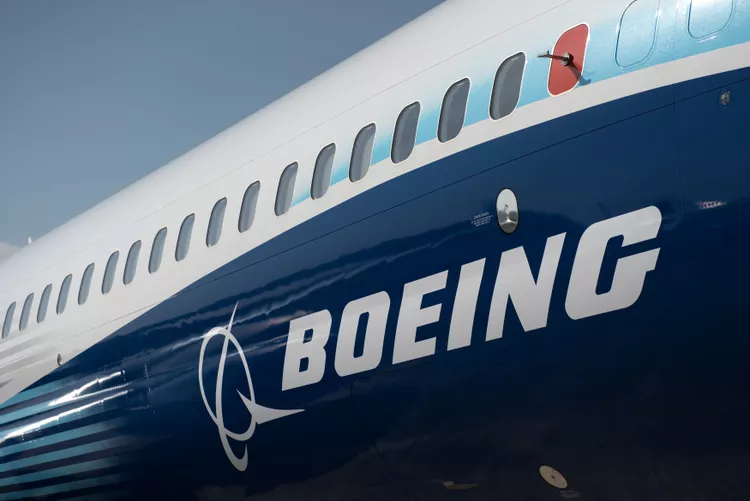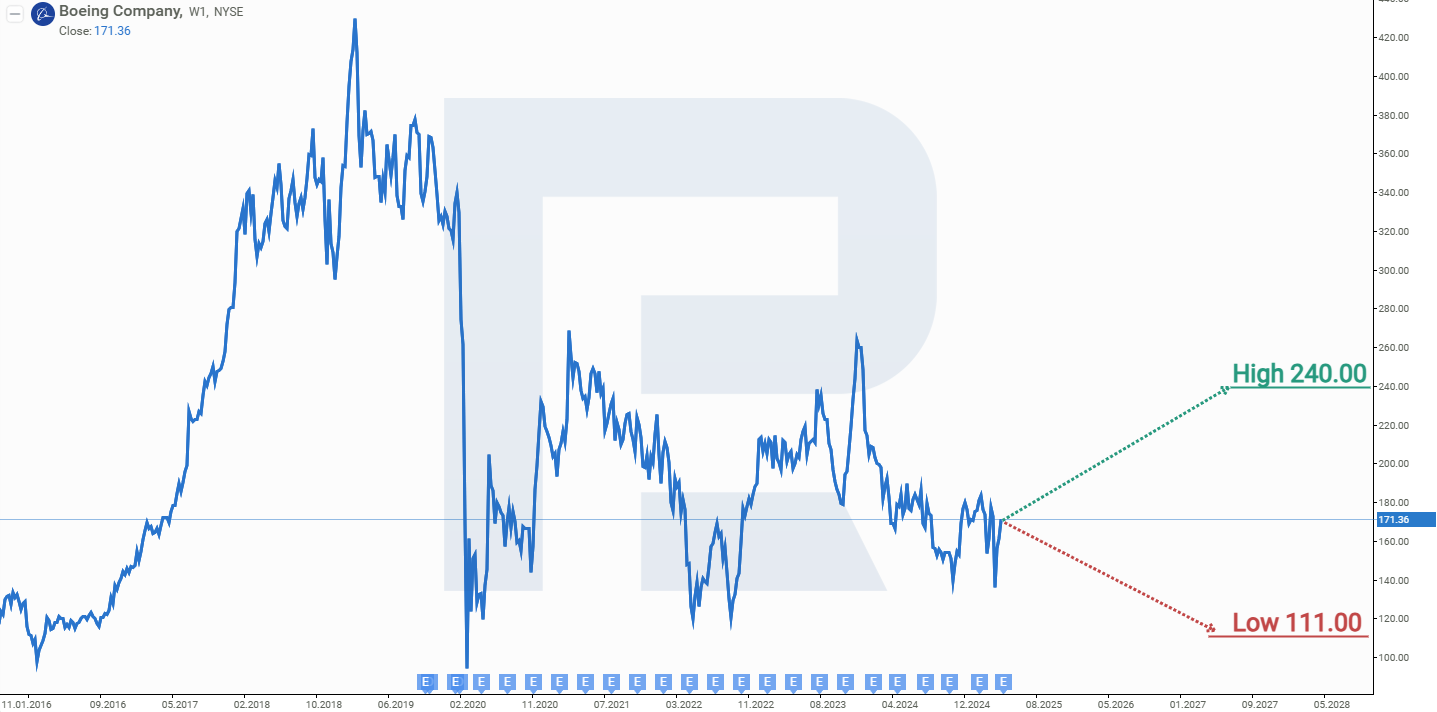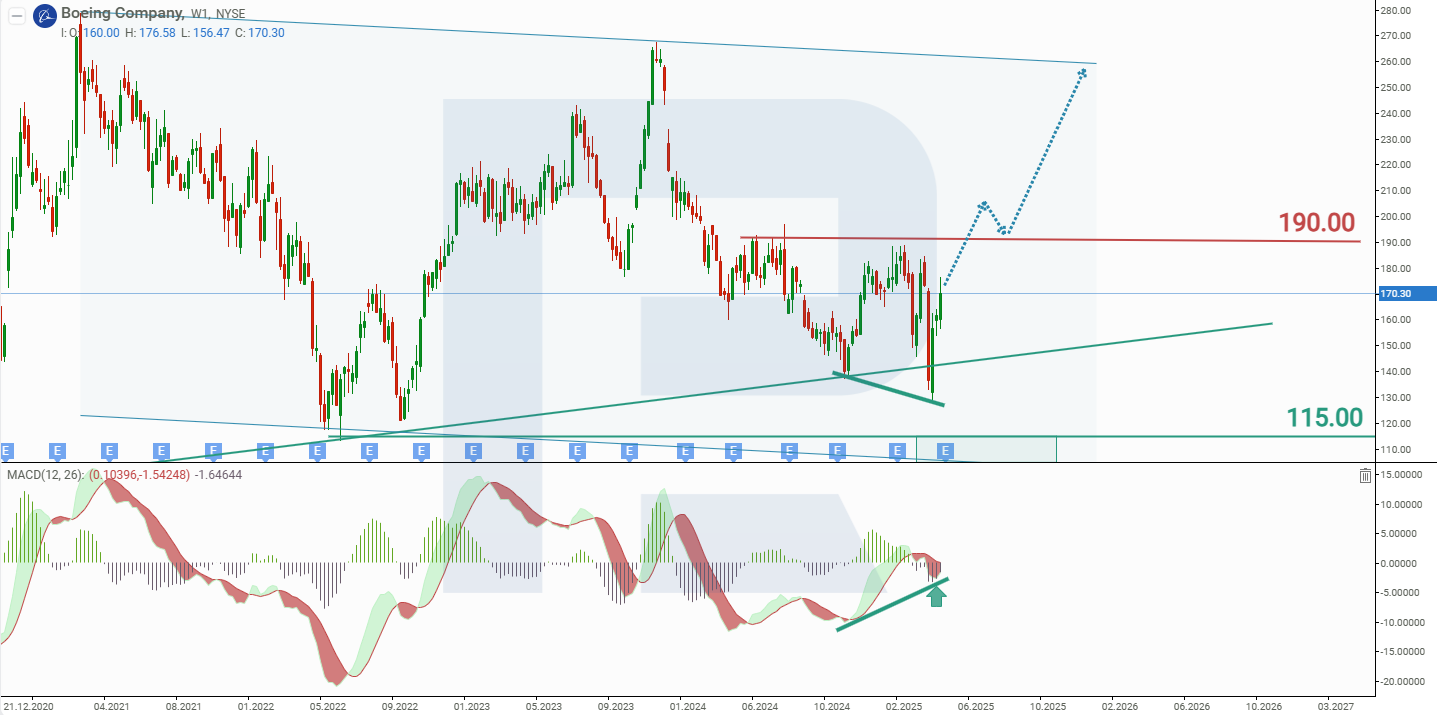Boeing emerges from the dip: investors rally as financials improve. The outlook for the stock is positive
Investors are snapping up shares of Boeing Company. A breach of the resistance level at 190 USD would increase the likelihood of BA’s prices rising to 260 USD.
The Boeing Company (NYSE: BA) Q1 2025 earnings report exceeded expectations. Revenue reached 19.5 billion USD, an 18% increase compared to last year, while the adjusted loss per share came in lower than forecast at 0.49 USD, compared to the expected 1.24 USD. The company delivered 130 commercial aircraft, up from 83 a year earlier, including 67 units of 737 MAX jets, and confirmed plans to increase 737 production to 38 aircraft per month by year-end. Additionally, Boeing announced the sale of its Digital Aviation Solutions division for 10.55 billion USD to strengthen its balance sheet. Investors received the improved financial performance positively, with the stock price rising by more than 10% following the report’s release.
This article examines The Boeing Company, lists the sources of its revenues, and summarises its performance over the 2024 calendar year and Q1 2025. It also offers a technical analysis of BA, which serves as the basis for the Boeing stock price forecast for 2025.
About The Boeing Company
The Boeing Company is one of the world’s largest aerospace and defence firms. It was founded on 15 July 1916 by William Boeing in Seattle, Washington. The company is engaged in designing, manufacturing, and selling commercial aircraft, military equipment, satellites, missile systems and space technology. Additionally, Boeing offers both support services and financial solutions.
Boeing’s IPO took place in 1962, and the company is listed on the NYSE under the ticker BA.
Image of The Boeing Company nameThe Boeing Company’s key revenue streams
The Boeing Company generates revenue from the following sources:
- Commercial Airplanes (BCA): the manufacture and sale of commercial airliners, including the 737, 767, 777 and 787 Dreamliner models. This is the company’s largest segment by revenue, but also the most sensitive to market demand fluctuations, regulatory scrutiny, and technical risks. Boeing is actively working to regain ground following the earlier suspension of 737 MAX deliveries
- Defense, Space & Security (BDS): covers military aircraft, drones, satellite systems, missiles and equipment for NASA. This segment delivers stable revenues through long-term contracts with the US government and allied nations
- Global Services (BGS): aftermarket services, maintenance, personnel training, spare parts supply, digital solutions, and logistics. This division supports Boeing’s customer base in both civil and defence sectors, generating steady profits and high margins
- Boeing Capital Corporation (BCC): financial services, including leasing and customer financing. This segment helps Boeing clients fund aircraft purchases, particularly during periods of economic uncertainty
The Boeing Company’s financial position and key risk factors
Boeing ended 2024 with revenues of 66.5 billion USD, down 14% from the previous year. Its net loss reached 11.8 billion USD, significantly higher than the 2.2 billion USD loss recorded in 2023. Negative operating cash flow totalled 12.1 billion USD, underscoring severe financial strain. Despite this, the company’s order backlog remains substantial – around 521 billion USD, including more than 5,500 commercial aircraft orders – which signals sustained long-term demand.
A series of negative factors weighed on Boeing’s 2024 financial performance. Chief among them was a strike by the International Association of Machinists and Aerospace Workers (IAM), which halted production of the 737, 767, and 777/777X models, significantly impacting delivery volumes. The company also incurred substantial restructuring costs, including staff reductions and internal restructuring. In the defence segment, additional expenses across several contracts further reduced profitability and eroded margins in this division.
At the end of 2024, Boeing held approximately 26.3 billion USD in cash and marketable securities. However, high debt levels and negative free cash flow pose a risk to the company’s financial stability. Should these figures persist, they could affect Boeing’s credit ratings and its ability to fund future programs.
Despite the challenging situation, Boeing’s management is taking active steps to stabilise operations. Production of key aircraft models resumed after the strike ended. Efforts are underway to reduce costs and improve operational efficiency. Particular focus is being placed on enhancing quality control and ensuring product safety – critical factors in regaining the trust of both customers and aviation regulators.
At the same time, Boeing’s large order book, government contracts and the potential recovery of its commercial division offer a foundation for a gradual return to stability.
The Boeing Company Q1 2025 financial results
On April 23, The Boeing Company published its Q1 2025 earnings report, which exceeded analysts’ expectations. Below are the key figures:
- Total revenue: 19.49 billion USD (+18%)
- Loss: 31 million USD (compared to 355 million USD in Q1 2024)
- Loss per share: 0.49 USD (compared to 1.13 USD in Q1 2024)
- Operating margin: 2.4% (compared to -0.5% in Q1 2024)
- Free cash flow: -2.3 billion USD (compared to -3.9 billion USD in Q1 2024)
- Aircraft deliveries: 130 units (+57%)
Revenue by segment:
- Aircraft sales revenue: 16.14 billion USD (+21%)
- Service revenue: 3.34 billion USD (+1%)
- Commercial Airplanes: 8.14 billion USD (+75%)
- Defense, Space & Security: 6.26 billion USD (-9%)
- Global Services: 5.06 billion USD (no change)
Boeing’s Q1 2025 report reflects cautious optimism regarding the recovery of the aviation giant. The company reported an adjusted loss per share of 0.49 USD, significantly better than analysts’ expectations of a loss of 1.24 USD, highlighting the effectiveness of the measures introduced by CEO Kelly Ortberg.
The substantial 57% year-on-year increase in commercial aircraft deliveries, including the 737 MAX, underscores operational resilience despite the challenges faced in 2024, such as strikes and regulatory issues. The 737 MAX program is gradually increasing production rates, with plans to reach 38 aircraft per month by year-end.
The order book has grown to 545 billion USD, covering over 5,600 aircraft, providing a solid foundation for future revenue. Regarding cash flow, Boeing showed a smaller outflow than expected, and Ortberg’s forecast of positive cash flow in Q2 2025 reflects ambitious goals. The sale of its Jeppesen division to Thoma Bravo for 10.55 billion USD demonstrates a strategic approach to asset optimisation and strengthening the financial position.
Despite this progress, the company still faces several challenges. The trade tensions between the US and China have led Chinese airlines to suspend the acceptance of Boeing aircraft, forcing the company to redirect deliveries to other markets. Additionally, a court case is expected in June regarding allegations that Boeing committed fraud against the US government related to the 737 MAX crashes.
Following the earnings release, Boeing’s stock rose by 6%, although it has fallen by 9% since the beginning of the year due to regulatory and geopolitical factors. Given Boeing’s market leadership and stable defence contracts, the current share price could present an opportunity for investors willing to take on risk. FAA restrictions on 737 MAX production and supply chain issues remain, but progress in stabilising production suggests these are temporary challenges.
Ortberg’s ability to implement internal reforms and restore investor confidence remains a key factor. If the strategy is successfully executed and external risks are minimised, Boeing’s stock could become an attractive asset for investors.
Expert forecasts for The Boeing Company shares
- Barchart: 17 of 25 analysts rated Boeing shares as a Strong Buy, one as a Moderate Buy, six as a Hold, and one as a Strong Sell. The high price target is 240 USD, while the low is 111 USD
- MarketBeat: 16 out of 23 specialists issued a Buy rating for the shares, six gave a Hold recommendation, and one gave a Sell. The high price target is 240 USD, and the low is 111 USD
- TipRanks: 13 out of 19 respondents gave the shares a Buy rating, five recommended Hold, and one recommended Sell. The high price target is 240 USD, while the low is 111 USD
- Stock Analysis: out of 18 experts, eight rated the shares as a Strong Buy, five as a Buy, four as a Hold, and one as a Sell. The high price target is 240 USD, while the low is 111 USD
The Boeing Company stock price forecast for 2025
On the weekly timeframe, the MACD indicator continues to show convergence, signalling a potential rise in Boeing’s share price, which is approaching resistance at 190 USD. Based on the current performance of The Boeing Company, the possible movements in 2025 are as follows:
The base case forecast for BA shares suggests a breakout above the resistance at 190 USD, followed by a rise towards the resistance line at 260 USD.
As an alternative scenario, the forecast for BA stock suggests a breakout below the trendline at 150 USD, which could result in the share price falling to 115 USD.
The Boeing Company stock analysis and forecast for 2025Forecasts presented in this section only reflect the author’s private opinion and should not be considered as guidance for trading. RoboForex bears no responsibility for trading results based on trading recommendations described in these analytical reviews.




